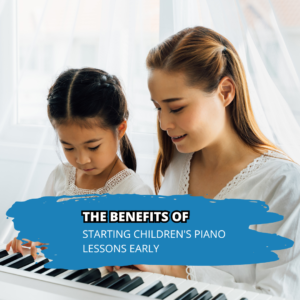The Benefits of Starting Children’s Piano Lessons Early

The Importance of Children’s Piano Lessons
Starting children’s piano lessons early can unlock many cognitive and developmental benefits that extend far beyond the music room. Engaging children in piano education from a young age not only introduces them to the world of music but also sets a foundation for lifelong learning and development. These lessons equip children with skills ranging from enhanced memory to increased discipline, fostering a well-rounded development.
By integrating children’s piano lessons into their routine, parents can provide a nurturing environment for growth, creativity, and emotional expression. Moreover, early exposure to piano playing can stimulate brain development in ways other activities cannot, paving the way for academic and personal success. Children who begin their musical journey early often show remarkable advancements in cognitive functions, showcasing the profound impact of music on a young learner’s mind.
The Impact of Piano Lessons on Brain Development
The intersection of music and brain development presents a fascinating area of exploration, with piano lessons playing a pivotal role in this dynamic.
Neural Connections and Cognitive Development
Children’s piano lessons are a potent tool for stimulating neurological growth, enhancing brain structure, and fostering cognitive development. The act of reading music and translating it into hand movements requires a level of coordination and cognitive effort that is unparalleled in other childhood activities. This complex process strengthens neural pathways, improving areas of the brain responsible for spatial-temporal reasoning, problem-solving, and cognitive flexibility. Engaging in piano lessons from a young age encourages the brain to develop in a more interconnected and efficient way, laying the groundwork for enhanced learning capabilities across various disciplines.
Enhancing Memory Through Music
Music education, particularly piano lessons, has been shown to significantly boost memory capacity in children. The repetitive nature of practice, combined with the challenge of memorizing pieces, exercises the brain’s memory functions, leading to improvements in both short-term and long-term memory. Children’s piano lessons encourage the use of memory and pattern recognition, skills that are transferable to academic settings and beyond.
Discipline and Persistence
The journey of learning to play the piano unveils a landscape rich with challenges and achievements, where the discipline and persistence are developed.
Developing a Routine
The structured nature of children’s piano lessons instills a sense of discipline and time management from an early age. By committing to regular practice sessions, children learn the value of scheduling and prioritizing their tasks, a skill that transcends the music classroom. This discipline in managing their practice times fosters a responsible attitude towards their commitments, reflecting positively in their academic and personal life.
Overcoming Challenges
Piano lessons present children with a series of challenges, from mastering complex pieces to performing in front of an audience. The process of overcoming these hurdles teaches persistence and resilience, virtues that are invaluable throughout life. Children learn to view challenges as opportunities for growth, a mindset that prepares them for future obstacles. The resilience developed through piano practice encourages a proactive approach to problem-solving and goal achievement.
Emotional Intelligence and Social Skills
The study of music, and specifically piano lessons, serves as a unique conduit for emotional and social development among children.
Expressing Emotions Through Music
Piano lessons offer children a unique avenue for emotional expression and development. Through music, children can explore and convey a wide range of emotions, from joy to sadness, fostering emotional intelligence. The ability to express oneself musically contributes to a child’s emotional well-being and self-awareness, laying the foundation for empathetic interactions and relationships.
Building Confidence and Empathy
Performing music in front of others, a common part of piano lessons, builds confidence and social skills. Children learn to communicate their feelings and ideas through music, enhancing their ability to connect with others. This experience not only boosts their self-esteem but also develops empathy, as they learn to understand and appreciate the emotions conveyed by their peers through musical performances.
The Role of Early Musical Education in Academic Achievement
The symbiotic relationship between early musical education and academic achievement has garnered attention from educators, parents, and researchers alike.
Correlation Between Music and Math Skills
The structured nature of music, with its inherent patterns and sequences, parallels mathematical concepts, making children’s piano lessons beneficial for developing math skills. Studies have shown that children engaged in music education perform better in mathematics, as the skills acquired through music reading and rhythm comprehension translate into mathematical problem-solving abilities.
Music Education and Language Development
Music education, particularly through piano lessons, enhances language development in children. The process of learning music improves phonetic awareness and listening skills, which are critical for language acquisition and literacy. Children’s piano lessons also expand vocabulary and comprehension, as they are introduced to new terms and concepts, fostering an enriched linguistic environment.
Expert Opinions and Scientific Studies Supporting Early Piano Lessons
Research and expert opinions consistently highlight the profound impact of early music education on children’s development. Studies have demonstrated that children’s piano lessons can lead to enhanced brain function, improved academic performance, and increased emotional and social competencies. Renowned educational psychologists and music educators advocate for the integration of music into early childhood education, citing its unparalleled benefits in developing a child’s cognitive, emotional, and social abilities. These findings underscore the value of starting piano lessons at a young age, offering children a comprehensive developmental advantage.
How Elite Music Academy Enhances Your Child’s Development Through Piano Lessons
Elite Music Academy stands at the forefront of nurturing young talents through comprehensive and engaging music lessons tailored for children including piano lessons. Our experienced instructors are dedicated to fostering an environment where children can explore their musical abilities while reaping the cognitive, emotional, and social benefits of early music education.
We believe in the transformative power of music and its ability to enhance a child’s development holistically. Whether your child is just beginning their musical journey or looking to advance their skills, we offer a nurturing and supportive environment for all. Join us in unlocking your child’s potential and setting them on a path of lifelong learning and achievement through the joy of music! Check out our reviews from our music academy community!
FAQs
1. What age is ideal to start children’s piano lessons?
While children can start piano lessons as young as 3 to 5 years old, the ideal age often depends on the child’s individual readiness, including their ability to focus and their fine motor skills development.
2. Can children’s piano lessons help with anxiety or stress?
Yes, engaging in piano lessons and music can be a therapeutic activity that reduces stress and anxiety in children, providing them with a form of emotional release and a way to express themselves creatively.
3. How often should my child practice piano outside of lessons?
Consistency is key. Daily practice is recommended, starting with 10-15 minutes for younger children and gradually increasing the duration as they grow older and more focused.
4. What milestones can I expect my child to reach in their first year of piano lessons?
In the first year, milestones might include learning basic music theory, developing a repertoire of simple songs, beginning to read music, and improving hand coordination and finger strength.
5. What challenges might my child face when starting piano lessons, and how can we overcome them?
Initial challenges may include frustration with difficult pieces, maintaining regular practice, and nervousness about performances. Overcoming these challenges involves patience, encouragement, and sometimes adjusting the practice and learning goals to be more achievable.






